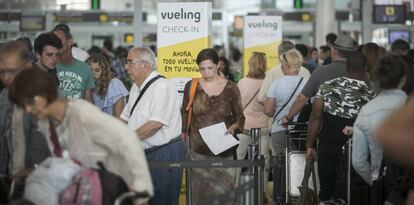What happens when you call Vueling to file a claim after a delay
Dozens of passengers report that they are receiving no response to their compensation requests

This Sunday, the Public Works Ministry opened an investigation into airline Vueling after its fourth consecutive day of flight cancellations and delays, although the company’s punctuality index has been plummeting for over six months. Since November 2015, Vueling’s punctuality ranking has dropped from nine to 36 out of 40 low-cost European carriers, going from 85% of flights being on time to 63%. According to FlightStats, in the last 30 days Vueling has had 423 cancelled flights (the sixth most out of low-cost carriers) and 8,638 delays (third most). While the company has not responded to EL PAÍS about the number of claims filed in these past months, dozens of irate passengers have turned to social media to criticize the airline for its lack of answers.
Indignation over lack of response
Vueling’s hotline number provides no information about the compensation that its passengers are entitled to. An automated answering program leads callers in circles, and as soon as they ask about reimbursement, the machine instructs passengers to send an email instead. After sending the email, an automatic response from the company offers a discount voucher for €20. If this coupon is rejected, the company does not respond. A quick Twitter search reveals hundreds of messages from customers frustrated with the lack of answers to their compensation claims for delays and cancellations. One user published a response from Vueling in which the company admitted that it was unable to respond “within the usual time frame.”
Rubén Sánchez is the spokesperson for FACUA, a Spanish NGO dedicated to consumers’ rights. “It’s unacceptable that after causing such chaos at the airports, a business like Vueling isn’t capable of returning the calls that it receives,” he said. “The law requires that passengers with delays of three hours or more have the right to between €250 and €600 in compensation.” This newspaper has reached out to some of the affected travelers who say that they have received no response to their claims for delays or cancellations.
When the company doesn’t respond
This Monday, the AESA, the state-run Aviation Security Agency, published instructions explaining how to proceed after experiencing a delay or cancellation with Vueling. To sum up, in addition to bearing the costs of food and drink and accommodation that resulted from the schedule problems, the company is obligated to compensate any delays longer than three hours. For cancellations, the full price of the ticket is supposed to be refunded within seven days. Once the claim has been submitted to the airline, if no response is received, the customer can turn to the AESA. The agency stresses that consumers should exercise their right to demand compensation, and if the company doesn’t set up sufficient channels after that, they can fill out a form found on the AESA website and send it to the airline’s customer service department.
“This is the piece of paper that the Vueling office gives you when you ask for a complaints form”
Changing the law to “avoid fraud”
Between January 1 and May 31, 2016, the AESA received 5,670 claims from customers who were affected by airline delays or cancellations, as opposed to only 3,888 during the same period in 2015. For confidentiality reasons, the AESA cannot release how many of those were from Vueling flights, but it did announce two things: air traffic has “increased dramatically” during the past year, and passengers are becoming more and more aware of their rights. “There has been an avalanche of inquiries, mostly through social media. People have to know that they are entitled to monetary compensation. That’s the key to ending fraud,” said the spokesperson for FACUA. “The regulations need to be changed. The company should have to automatically repay all claims rather than dealing with them one by one. Refunds should be automatic and obligatory, and be paid via bank transfer. If paying this compensation delivered the economic blow that it should, airline companies wouldn’t abuse their customers in this way,” he added.
English version by Allison Light.
Tu suscripción se está usando en otro dispositivo
¿Quieres añadir otro usuario a tu suscripción?
Si continúas leyendo en este dispositivo, no se podrá leer en el otro.
FlechaTu suscripción se está usando en otro dispositivo y solo puedes acceder a EL PAÍS desde un dispositivo a la vez.
Si quieres compartir tu cuenta, cambia tu suscripción a la modalidad Premium, así podrás añadir otro usuario. Cada uno accederá con su propia cuenta de email, lo que os permitirá personalizar vuestra experiencia en EL PAÍS.
¿Tienes una suscripción de empresa? Accede aquí para contratar más cuentas.
En el caso de no saber quién está usando tu cuenta, te recomendamos cambiar tu contraseña aquí.
Si decides continuar compartiendo tu cuenta, este mensaje se mostrará en tu dispositivo y en el de la otra persona que está usando tu cuenta de forma indefinida, afectando a tu experiencia de lectura. Puedes consultar aquí los términos y condiciones de la suscripción digital.








































